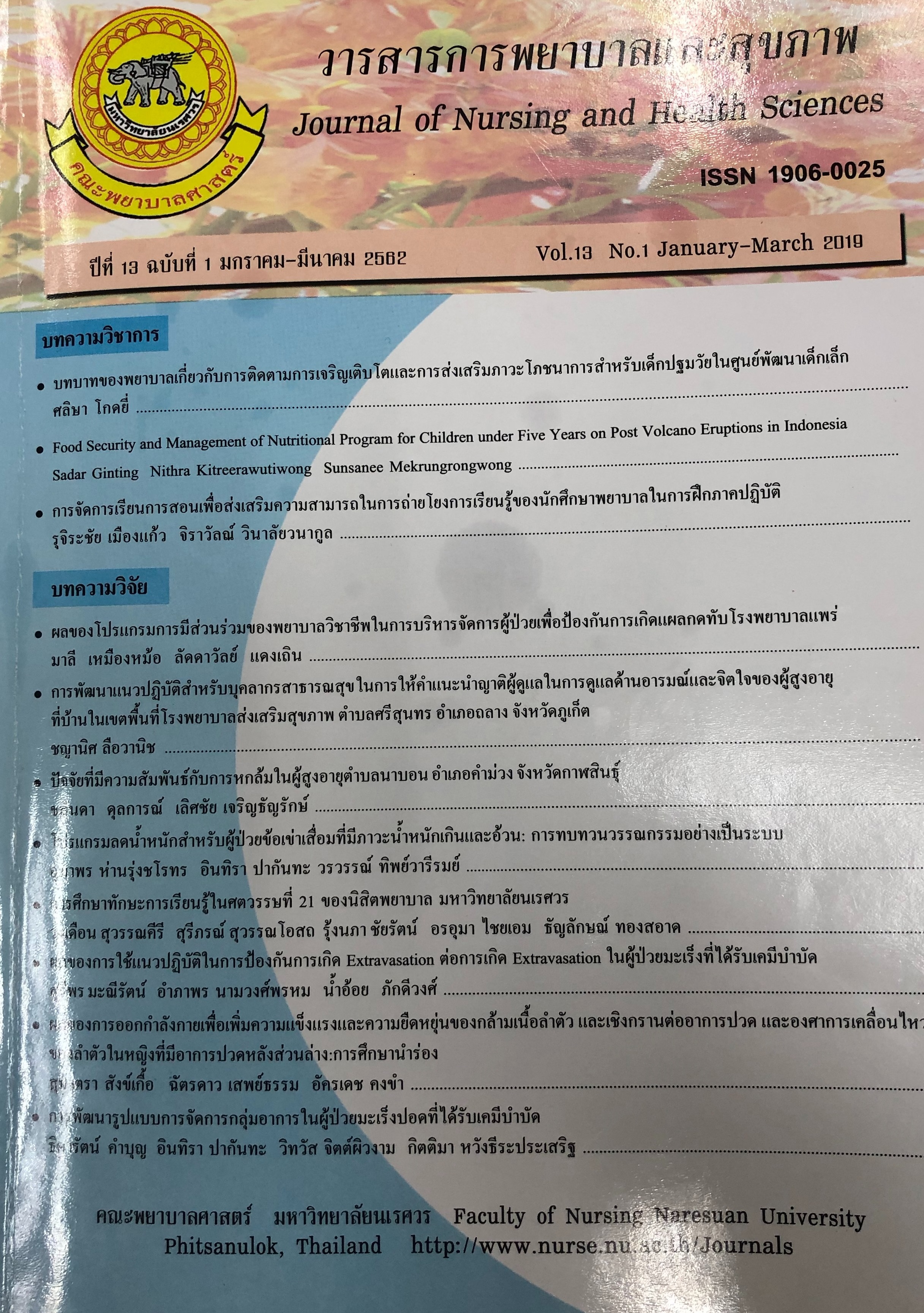ผลของการใช้แนวปฏิบัติในการป้องกันการเกิด Extravasation ต่อการเกิด Extravasation ในผู้ป่วยมะเร็งที่ได้รับเคมีบำบัด*
Main Article Content
บทคัดย่อ
การศึกษาครั้งนี้เป็นการวิจัยแบบวัดหลังและมีกลุ่มเปรียบเทียบเพื่อศึกษาผลของการใช้แนวปฏิบัติ ที่ปรับปรุงขึ้นจากหลักฐานเชิงประจักษ์ในการป้องกันการเกิด Extravasation ในผู้ป่วยมะเร็งที่ได้รับเคมีบำบัด กลุ่ม FOLFOX กลุ่มตัวอย่างเป็นผู้ป่วยมะเร็งที่ได้รับเคมีบำบัดที่เข้ารับการรักษาในหอผู้ป่วย 14 โรงพยาบาล จุฬาภรณ์ระหว่างเดือนสิงหาคม พ.ศ. 2560 ถึงเดือนกรกฎาคม พ.ศ. 2561 คัดเลือกแบบเฉพาะเจาะจงจำนวน 70 ราย แบ่งเป็น 2 กลุ่ม คือ กลุ่มเปรียบเทียบจำนวน 44 ราย ซึ่งได้รับการดูแลตามแนวปฏิบัติปกติของโรงพยาบาล และกลุ่มที่ใช้แนวปฏิบัติ จำนวน 26 ราย ซึ่งได้รับการดูแลโดยใช้แนวปฏิบัติในการป้องกันการเกิด Extravasation ที่ปรับปรุงจากหลักฐานเชิงประจักษ์ เก็บรวบรวมข้อมูลประเมินการเกิด Extravasation ตั้งแต่ ผู้ป่วยเริ่มได้รับเคมีบำบัดจนกระทั่งได้รับเคมีบำบัดครบ วิเคราะห์ข้อมูลพื้นฐานของกลุ่มตัวอย่างโดยใช้สถิติ เชิงบรรยาย เปรียบเทียบความแตกต่างของการเกิด Extravasation ระหว่างกลุ่มใช้แนวปฏิบัติและกลุ่มเปรียบเทียบ โดยใช้สถิติ Fisher's Exact test ผลการวิจัยพบว่ากลุ่มที่ได้รับการดูแลโดยใช้แนวปฏิบัติตามปกติเกิด Extravasation จำนวน 6 คน (ร้อยละ 13.64) ในขณะที่กลุ่มที่ใช้แนวปฏิบัติที่ปรับปรุงขึ้นจากหลักฐานเชิงประจักษ์ไม่เกิด Extravasation เมื่อทดสอบด้วยสถิติ Fisher's Exact test พบว่าไม่แตกต่างกัน (p = .078) ซึ่งความรุนแรงของการเกิด Extravasation อยู่ในระดับ 2 ทั้งหมด ผู้วิจัยเสนอแนะให้ทำวิจัยซ้ำโดยเพิ่มขนาดของกลุ่มตัวอย่างให้มากขึ้น
Article Details
เอกสารอ้างอิง
Avdal, E.U. & Aydinoglu, N. (2012 ). Extravasation of
vesicant / non- vesicant drugs and evidence - based
management. International journal of caring
sciences, 5(2), 191-202.
Benna, S.A., Boyle, C.O. & Holley, J. (2013). Extravasation
injuries in adults. ISRN Dermatology., 1-8.
Deery, P. & Laurie, A. (2009). Guidelines for prevention
and management of chemotherapy extravasation.
Surrey, West Sussex and Hampshire cancer
network NHS.
Fidalgo, J.A., Fabregat, L. G., Cervantes, A., Margulies,
A., Vidall, C. & Rolia, F. (2012). Management
of chemotherapy extravasation : ESMO-EONS
clinical practice guidelines. Annals of oncology,
, 68-73.
Gonzalez, T.(2013). Chemotherapy extravasation:
prevention, identification, management, and
documentation. Clinical Journal of Oncology
Nursing, 17, 61-66.
Kreidieh, F.Y., Moukadem, H.A. & Saghir,N.S. (2016).
Overview, prevention and management of
chemotherapy extravasation. World Journal of
Clinical Oncology, 7(1), 87-95.
Molas, F., Ayuso, E. & Oubina, F. (2015). Level of adherence
to an extravasation protocol over 10 years
in a tertiary care hospital. Clinical journal of
oncology nursing, 19, 25-30.
National Cancer Institute. (2015). Chemotherapy.
Retrieved 3 February 2017 from https://www.
cancer.gov/about-cancer/treatment/types/chemotherapy#
Pico, B., Laczo, I., Szatmari, K., Bassam, A., Szabo, Z.,
Ocsai, H. & Csotye, J. (2013). Overview of
extravasation management and possibilities for
risk reduction based on literature data. Journal of
nursing education and practice, 3, 93-105.
Sakaida, E., Sekine, I., Iwasawa, S., Kurimoto, R., Uehara,
T., Ooka, Y., . . . Takiguchi, Y. (2014). Incidence,
risk factors and treatment outcomes of extravasation
of cytotoxic agents in an outpatient
chemotherapy clinic. Japanese Journal of
Clinical Oncology, 44, 168-171.
Sharp, S. (2015). Guideline for management of extravasation
of a cytotoxic agent or a monoclonal
antibody used in treatment of malignant disease.
Guideline for management of extravasation.
Stanley, A. (2011). Guideline for the management of
extravasation. Pan Birmingham cancer network
governance committee chair.
Wengstrom, Y., Foubert, J., Margulies, A., Roe, H. &
Bugeia, S. (2007). Extravasation guidelines 2007.
European Oncology Nursing Society clinical practice
guidelines.
WOSCON Cancer Nursing and Pharmacy Group. (2009).
Chemotherapy extravasation guideline. West of
Scotland Cancer Advisory Network Clinical Leads
Group.


